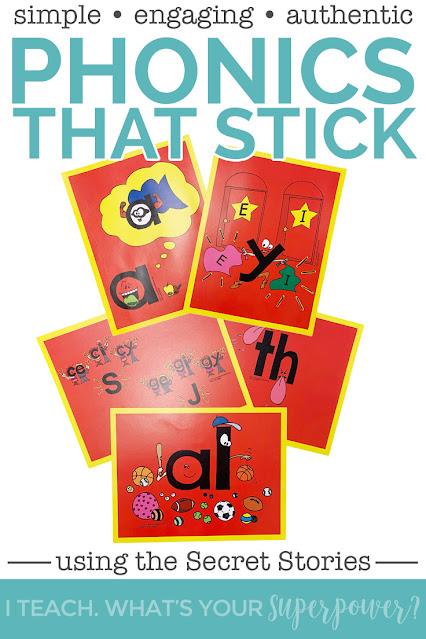It's no secret that I'm a big fan of the Secret Stories. (Lord, that was cheesy-sorry about that.) BUT telling a story and sticking a poster on the wall is not going to be a game changer for students. Students need lots of opportunities to practice and apply letter/sound patterns to really internalize them. Here are four ways I bridge phonics instruction from a fun story, motion, and picture into reading and writing application.
psst-Not sure what the Secret Stories actually are? Only the best way to fast tract phonics. You can read more about them on this blog post, this instastory, this GYTO virtual session on YouTube, and (of course) the Secret Stories site.
Word Detective
It's stupid simple. My 2nd graders loved playing word detective, but I was SHOCKED to find out the 5th graders I work with in small groups love it just as much. As in, "We're going to play that detective thing again today, right?" Give kids a clue about a word from a shared text, and let them get started thinking:
•Who can find a word with two letters that are always fighting and punching and kicking each other?
•Can you find a two syllable word with a bad driver?
•Which word has two letters that are always bouncing around AND a sneak y?
That's it.
For whole group, we often played it using our morning message and students would come up and highlight the word. In small groups, we look at a page in the book they're reading to identify a word.
Zookeepers
By the time kids get to 2nd grade, they've gotten into a really bad habit of approximation. In kindergarten, writing rz for rose was great. They've spent so much time writing without access to the sounds they need, that approximation is ingrained. It seems logical that once you tell kids a pattern, they'd start using it. You'd be wrong.
We start by playing a game called Zookeepers from Katie Garner's Secret Stories book. It's as dumbly simple as Word Detective.
Basically the kids are zookeepers and some animals have escaped. To be a good zookeeper, you have to catch all the animals. Then you tell them how many animals have escaped. The number of animals depends on the number of letters or phonemes depending on how you want to work with kids. (Ex. rain=4 letters or 3 phonemes.) They draw a line for each of the escaped animals and have to "catch" all of them.
Accountability
All those guessing habits continue in reading. One of the prompts I use with students to use is, "Do you see any stories that will help you with that?" My FAVORITE is when I see kids working out a word, and they see a short u. I can't tell you how many kids I have seen working towards automaticity put a finger on their head just like short and lazy u does when she makes her confused sound.
In writing, I start to hold them accountable by underlining a few words that I know they have a story for but didn't. This is where you can really support and encourage kids to move away from approximation and use what they know.
Actual conversation with a student last week-
Me: Work on that word some more. I know you know a story that can help you with it.
Student: (big smile) I just guessed it!
Me: Those days are over. You have stories and now we need to use them!
Bribery
Yep. I said what I said. In one of my small groups right now, I'm really pushing students to use those stories when they return to class. If a kiddo brings me a list of five words they found in their own books AND can tell me the story + read the word, they can pick an eraser from my Target Dollar Spot stash. If they bring 10, they can choose an eraser and borrow an Elephant and Piggie book. This is a short term move to get students to apply their learning outside of our small group.
And PS
Are you still here? Here's a heart moment from a few years ago. I had a student that was significantly behind and most likely had a learning disability. In January, they called me over to the morning message before our day started. They were SO EXCITED. "That's th! That says /th/! That's /th/ /th/ this! Are we going to play that word game with the marker this morning?" You better believe we played that word game with the marker.
I love this story because it highlights student success but also that any time of year can be an access point for students. I had taught the th story early in the year. Because the stories take about 15 seconds, we can quickly refer to them all year long. If a student's not ready for th in August? That's okay. The story is waiting for when they're ready.






